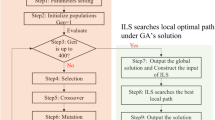Abstract
Job scheduling has always been a challenging task in modern manufacturing and the most real life scheduling problems which involves multi-criteria, multi-machine environments. In this research, the single-machine scheduling problem is studied in which job processing times are controllable, namely, they may vary within a specified interval. The goal of this research is to minimize total tardiness and earliness on a single machine, simultaneously. In this context, we first propose a mathematical model for the considered problem and then a net benefit compression–net benefit expansion heuristic is presented for obtaining the set of amounts of compression and expansion of jobs processing times in a given sequence. Two meta-heuristic approaches are then employed to solve medium-to-large-sized problems as local search methods. Thereafter, we apply a hybrid method based on our heuristic as well as these two meta-heuristics in order to obtain solutions with higher quality within lesser computational time. The addressed problem is NP-hard since the single machine total tardiness problem is already NP-hard. The computational results show that our proposed heuristics can effectively solve such Just-In-Time problem with a high-quality solution.
Similar content being viewed by others

References
Wang J-B (2006) Single machine scheduling with common due date and controllable processing times. Appl Math Comput 174:1245–1254
Yang H-A, Sun Q-F, Saygin C, Sun S-D (2012) Job shop scheduling based on earliness and tardiness penalties with due dates and deadlines: an enhanced genetic algorithm. Int J Adv Manuf Technol 61(5):657–666
Lee H-T, Yang D-L, Yang S-J (2012) Multi-machine scheduling with deterioration effects and maintenance activities for minimizing the total earliness and tardiness costs. Int J Adv Manuf Technol. doi:10.1007/s00170-012-4348-0
İşler M, Toklu B, Çelik V (2012) Scheduling in a two-machine flow-shop for earliness/tardiness under learning effect. Int J Adv Manuf Technol 61(9):1129–1137
Hashemi Doulabi SH, Avazbeigi M, Arab S, Davoudpour H (2012) An effective hybrid simulated annealing and two mixed integer linear formulations for just-in-time open shop scheduling problem. Int J Adv Manuf Technol 59(9):1143–1155
Vallada E, Ruiz R (2012) In: Ríos-Mercado RZZ, Ríos-Solís YAA (eds) Scheduling unrelated parallel machines with sequence dependent setup times and weighted earliness–tardiness minimization, just-in-time systems. Springer, New York, pp 67–90
Vickson RG (1980) Two single machine sequencing problems involving controllable job processing times. AIIE T 12:258–262
Nowicki E, Zdrzalka S (1990) A survey of results for sequencing problems with controllable processing times. Discrete Appl Math 26:271–287
Panwalkar SS, Rajagopalan R (1992) Single-machine sequencing with controllable processing times. Eur J Oper Res 59:298–302
Zdrzalka S (1991) Scheduling jobs on a single machine with release dates, delivery times and controllable processing times: worst case analysis. Oper Res Lett 10:519–523
Chen ZL, Lu Q, Tang G (1997) Single machine scheduling with discretely controllable processing times. Oper Res Lett 21:69–76
Shakhlevich NV, Strusevich VA (2006) Single machine scheduling with controllable release and processing parameters. Discrete Appl Math 154:2178–2199
Liman SD, Panwalkar SS, Thongmee S (1997) A single machine scheduling problem with common due window and controllable processing times. Ann Oper Res 70:145–154
Cheng TCE, Kovalyov MY, Shakhlevich NV (2006) Scheduling with controllable release dates and processing times: makespan minimization. Eur J Oper Res 175:751–768
Nowicki E (1993) An approximation algorithm for the m-machine permutation flow shop scheduling problem with controllable processing times. Eur J Oper Res 70:342–349
Nowicki E (1994) An approximation algorithm for a single-machine scheduling problem with release times, delivery times, and controllable processing times. Eur J Oper Res 72:74–81
Lee CY (1991) Earliness-tardiness scheduling problems with constant size of due-date window. Research report. Department of Industrial and Systems Engineering, University of Florida, Gainesville
Yin N, Wang X-Y (2011) Single-machine scheduling with controllable processing times and learning effect. Int J Adv Manuf Technol 54(5):743–748
Gupta JND, Kruger K, Lauff V, Werner F, Sotskov YN (2002) Heuristics for hybrid flow shops with controllable processing times and assignable due dates. Comput Oper Res 29:1417–1439
Gurel S, Akturk MS (2007) Scheduling parallel CNC machines with time/cost trade-off considerations. Comput Oper Res 34:2774–2789
Kayan RK, Akturk MS (2005) A new bounding mechanism for the CNC machine scheduling problems with controllable processing times. Eur J Oper Res 167:624–643
Alidaee B, Ahmadian A (1993) Two parallel machine sequencing problems involving controllable job processing times. Eur J Oper Res 70:335–341
Gurel S, Korpeoglu E, Akturk MS (2010) An anticipative scheduling approach with controllable processing times. Comput Oper Res 37:1002–1013
Shabtay D, Steiner G (2007) A survey of scheduling with controllable processing times. Discrete Appl Math 155:1643–1666
Tseng CT, Liao CJ, Huang KL (2009) Minimizing total tardiness on a single machine with controllable processing times. Comput Oper Res 36:1852–1858
Du J, Leung JYT (1990) Minimizing total tardiness on one machine is NP-hard. Math Oper Res 15:483–495
Hillier FS, Lieberman GJ (2001) Introduction to operations research, 7th edn. McGraw-Hill, New York
Ow PS, Morton TE (1989) The single machine early/tardy problem. Manag Sci 35(2):177–191
Li G (1997) Single machine earliness and tardiness scheduling. Eur J Oper Res 96:546–558
Ben-Daya M, Al-Fawzan M (1996) A simulated annealing approach for the one-machine mean tardiness scheduling problem. Eur J Oper Res 93:61–67
Etiler O, Toklu B, Atak M, Wilson J (2004) A genetic algorithm for flow shop scheduling problems. J Oper Res Soc 55:830–835
Author information
Authors and Affiliations
Corresponding author
Rights and permissions
About this article
Cite this article
Kayvanfar, V., Mahdavi, I. & Komaki, G.M. A drastic hybrid heuristic algorithm to approach to JIT policy considering controllable processing times. Int J Adv Manuf Technol 69, 257–267 (2013). https://doi.org/10.1007/s00170-013-5012-z
Received:
Accepted:
Published:
Issue Date:
DOI: https://doi.org/10.1007/s00170-013-5012-z



